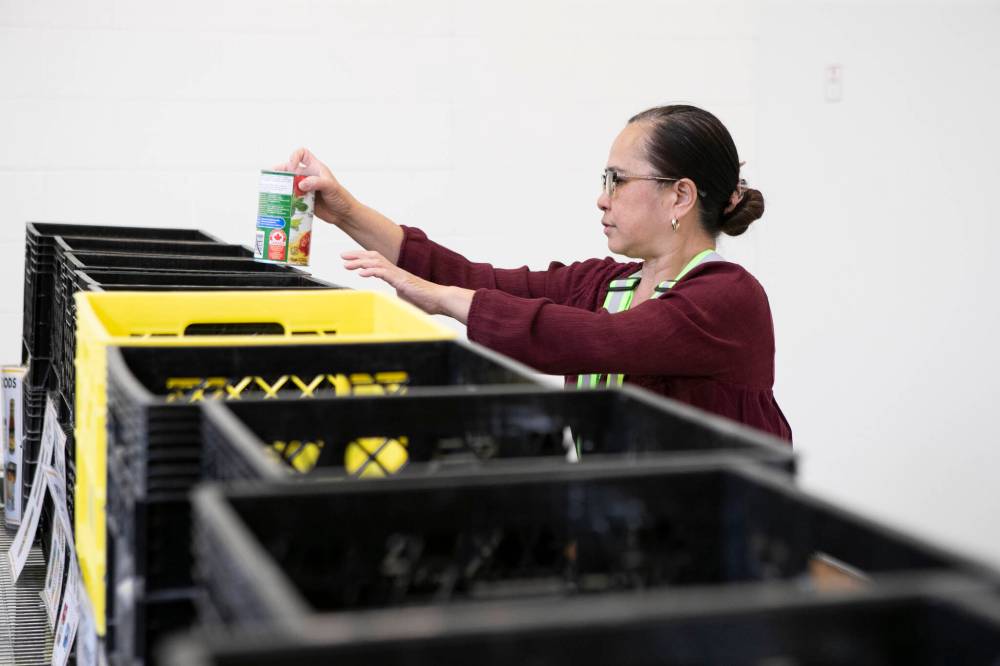Dumb political decisions fuel growing food-bank use
Advertisement
Read this article for free:
or
Already have an account? Log in here »
To continue reading, please subscribe:
Monthly Digital Subscription
$0 for the first 4 weeks*
- Enjoy unlimited reading on winnipegfreepress.com
- Read the E-Edition, our digital replica newspaper
- Access News Break, our award-winning app
- Play interactive puzzles
*No charge for 4 weeks then price increases to the regular rate of $19.00 plus GST every four weeks. Offer available to new and qualified returning subscribers only. Cancel any time.
Monthly Digital Subscription
$4.75/week*
- Enjoy unlimited reading on winnipegfreepress.com
- Read the E-Edition, our digital replica newspaper
- Access News Break, our award-winning app
- Play interactive puzzles
*Billed as $19 plus GST every four weeks. Cancel any time.
To continue reading, please subscribe:
Add Free Press access to your Brandon Sun subscription for only an additional
$1 for the first 4 weeks*
*Your next subscription payment will increase by $1.00 and you will be charged $16.99 plus GST for four weeks. After four weeks, your payment will increase to $23.99 plus GST every four weeks.
Read unlimited articles for free today:
or
Already have an account? Log in here »
Hey there, time traveller!
This article was published 20/02/2024 (640 days ago), so information in it may no longer be current.
Few statistics reveal the depth of poverty in a society the way food-bank use does. Even in the face of falling unemployment and rising wages, the number of people lined up at food banks can grow.
When it does, it begs the question: why are favourable economic conditions not trickling down to households more equitably? Why is food-bank use skyrocketing when the job market is booming and wages are rising faster than inflation, as they are in Manitoba right now?
It’s an age-old question in the field of economics. But it seems we’re no further ahead in answering it.

BROOK JONES / FREE PRESS FILES
The number of households served by Harvest Manitoba’s food bank in January increased by more than 3,000 compared with the same month last year.
Unemployment in Manitoba fell to four per cent in January, the lowest rate in Canada. It’s below the national average of 5.7 per cent and it’s down 0.3 per cent compared with January 2023. The only reason it didn’t fall further is because more people entered the labour market – a sign of a healthy economy.
The number of people with jobs in Winnipeg soared by more than 15,000 during the past year, a 3.6 per cent jump.
Wages are on the rise, too, up 3.6 per cent overall in Manitoba over the past year. That’s well above the province’s inflation rate of 0.8 per cent for January. Although still elevated and most punishing to low-income families, even rising grocery prices are showing signs of easing.
Despite that, the number of households served by Harvest Manitoba’s food bank in January increased by more than 3,000 compared with the same month last year.
Between April 2022 and March 2023, the average number of households per month using food banks was 15,713. That figure grew to 19,997 during the past 10 months — a staggering 27 per cent increase. It’s the kind of jump one might normally associate with rising unemployment and stagnant or falling wages, yet we’re seeing the opposite in Manitoba when it comes to job growth and hourly wages.
And it’s getting worse. In January 2024, the number of households served by Harvest Manitoba increased to 21,575.
That tells us (or reminds us of) two things: the need to support food banks by donating food, money and volunteer time has never been greater; and the economic benefits of falling unemployment and rising wages are not distributed equitably. They’re not “trickling down” the way they should, or the way we want them to.
Economists call it market failure. That’s not new. But the division between haves and have-nots seems to be getting worse, at least judging by soaring food-bank use.
There are other data that reinforce those inequities. Manitoba’s rate of child poverty, 24 per cent, is virtually tied with Saskatchewan’s for the highest in the country. Manitoba’s number of children under six living in poverty is the highest of all provinces.
Not only is that disgraceful (one in four kids not able to access proper food, clothing and shelter in a country as rich as ours); it has a negative and long-standing impact on the health-care system, crime, police budgets, courts, jails and, ultimately, the public treasury (a.k.a., how much we pay in taxes).
Kate Kehler of the Social Planning Council of Winnipeg made a good point recently. Kehler was quoted in a Free Press story saying it’s up to people who are living more comfortably to convince the provincial government to do a better job of targeting support to those who need it, as opposed to handing out “affordability cheques” to almost everyone, or cutting the gas tax (or any tax), which primarily benefits higher-income people.
Governments provide middle- and upper-income people with so-called affordability benefits because that segment of society is more likely to vote, said Kehler. People living in poverty tend to vote less. So it’s up to those who don’t need the gas-tax cut, or another round of education property-tax cuts, to tell government to smarten up and redirect those benefits to people who actually need them.
If enough voters expressed that sentiment and it was reflected in public-opinion polls and focus-group findings (which governments slavishly follow), it would change public policy.
People have to speak up. Politicians pay attention to the letters, emails and phone calls they receive. They tune in to social media posts, awareness campaigns and public rallies. If people want governments to stop implementing dumb policies such as cutting taxes while food-bank lineups grow, they have the power to do something about it.
History has shown that for the most part, politicians won’t do it on their own.
tom.brodbeck@freepress.mb.ca

Tom Brodbeck is an award-winning author and columnist with over 30 years experience in print media. He joined the Free Press in 2019. Born and raised in Montreal, Tom graduated from the University of Manitoba in 1993 with a Bachelor of Arts degree in economics and commerce. Read more about Tom.
Tom provides commentary and analysis on political and related issues at the municipal, provincial and federal level. His columns are built on research and coverage of local events. The Free Press’s editing team reviews Tom’s columns before they are posted online or published in print – part of the Free Press’s tradition, since 1872, of producing reliable independent journalism. Read more about Free Press’s history and mandate, and learn how our newsroom operates.
Our newsroom depends on a growing audience of readers to power our journalism. If you are not a paid reader, please consider becoming a subscriber.
Our newsroom depends on its audience of readers to power our journalism. Thank you for your support.







